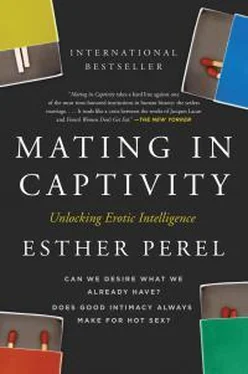What Sarah looks forward to is more than the sex; it’s the ritual. Spending ample time together, woman to man, they temporarily slip out of the chains of reality. Their foreplay lasts hours. They’ve been at this for twelve years, and like a mastered discipline, they miss it when they skip it. They know that great sex generally demands more than fifteen minutes right after the eleven o’clock news.
Cultivating Play
When couples complain that their sex life is listless, I know it isn’t mere frequency they’re after. They may want more, but they certainly want better. For this reason, I prefer to talk about their erotic life rather than about their sex life. The physical act of sex is too narrow a subject, which easily degenerates into a conversation about numbers. Human nature abhors a vacuum of intensity. People long for radiance. They want to feel alive. If given half a chance, loving partners can fill the intensity void with transcendence.
Animals have sex; eroticism is exclusively human. It is sexuality transformed by the imagination. In fact, you don’t even need the act of sex to have a full erotic experience, though sex is often hinted at, envisioned. Eroticism is the cultivation of excitement, a purposeful quest for pleasure. Octavio Paz likens eroticism to the poetry of the body, the testimony of the senses. Like a poem, it is not linear; it meanders and twists back on itself. It shows us what we see not with our eyes but with the eyes of our spirit. Eroticism reveals to us another world inside this world. The senses become servants of the imagination, letting us see the invisible and hear the inaudible.
Eroticism, intertwined as it is with imagination, is another form of play. I think of play as an alternative reality midway between the actual and the fictitious, a safe space where we experiment, reinvent ourselves, and take chances. Through play we suspend disbelief—we pretend something is real even when we damn well know it is not. Earnestness has no place here.
Play, by definition, is carefree and unself-conscious. The great theoretician of play, Johan Huizinga, maintained that a fundamental feature of play is that it serves no other purpose. The purposelessness associated with play is hard to reconcile with our culture of high efficiency and constant accountability. More and more, we measure play by its benefits. We play squash for cardiovascular conditioning; we take our kids to dinner to expand their palates; we go on vacation to recharge. Yet if we’re plagued by self-awareness, obsessed with outcomes, or fearful of judgment, our enjoyment is inevitably compromised.
When we are children, play comes to us naturally, but our capacity for play collapses as we age. Sex often remains the last arena of play we can permit ourselves, a bridge to our childhood. Long after the mind has been filled with injunctions to be serious, the body remains a free zone, unencumbered by reason and judgment. In lovemaking, we can recapture the utterly uninhibited movement of the child, who has not yet developed self-consciousness before the judging gaze of others.
Erotic Intelligence
Every so often, I meet couples who get it, who maintain a sense of playfulness with each other, in and out of the bedroom. They are physically and sensually alive—two people whose desire for one another hasn’t been left to languish. Even in our culture of immediate gratification, they’re able to see seduction as an end in itself. Johanna continues to bewitch her boyfriend of ten years by setting up rendezvous in motels in a nearby suburb. Darnell and his lover pretend not to know each other when they go to a party. Eric describes making love to his wife in the alley of their apartment building when they come home late at night, a furtive pleasure they indulge in before checking on the kids. Every year, Ivan and Rachel go away for a long weekend of consensual adultery with other swingers. “Instead of having secrets from each other, we have secrets from the world.” Jessica has rescued her husband from many lonesome stretches on the road by teasing him on the CB radio. Every morning, Leo tells his wife how lucky he is to be married to her, and he still means it after more than fifty years.
For all these couples, playfulness is central to their relationship, and eroticism extends beyond the sexual act. Their lovemaking can be ceremonious or sudden, soulful or utilitarian, vanilla or transgressive, warm or hot. The point is that sex is pleasurable and inviting, not dutiful. They revere the erotic, yet they delight in its irreverence. They like sex, they especially like it with each other, and they take the time to nurture an erotic space.
Like all couples, they go through periods when desire is dormant—when they are estranged from each other, or simply immersed in their own projects and in their own lives—but they don’t panic, terrified that something is fundamentally wrong with them. They know that erotic intensity waxes and wanes, that desire suffers periodic eclipses and intermittent disappearances. But given sufficient attention, they can bring the frisson back.
For them, love is a vessel that contains both security and adventure, and commitment offers one of the great luxuries of life: time. Marriage is not the end of their romance, it’s the beginning. They know that they have years in which to deepen their connection, to experiment, to regress, and even to fail. They see their relationship as something alive and ongoing, not a fait accompli. It’s a story that they are writing together, one with many chapters, and neither partner knows how it will end. There’s always a place they haven’t gone yet, always something about the other still to be discovered.
Modern relationships are cauldrons of contradictory longings: safety and excitement, grounding and transcendence, the comfort of love and the heat of passion. We want it all, and we want it with one person. Reconciling the domestic and the erotic is a delicate balancing act that we achieve intermittently at best. It requires knowing your partner while recognizing his persistent mystery; creating security while remaining open to the unknown; cultivating intimacy that respects privacy. Separateness and togetherness alternate, or proceed in counterpoint. Desire resists confinement, and commitment mustn’t swallow freedom whole.
At the same time, eroticism in the home requires active engagement and willful intent. It is an ongoing resistance to the message that marriage is serious, more work than play; and that passion is for teenagers and the immature. We must unpack our ambivalence about pleasure, and challenge our pervasive discomfort with sexuality, particularly in the context of family. Complaining of sexual boredom is easy and conventional. Nurturing eroticism in the home is an act of open defiance.
Notes
1: From Adventure to Captivity
The original primordial fire: Octavio Paz. 1995. The Double Flame: Love and Eroticism . San Diego, Calif.: Harvest, p. x.
Hence the division between the romantics and the realists: Ethel Spector Person. 1988. Dreams of Love and Fateful Encounters: The Power of Romantic Passion . New York: Penguin.
Stephen Mitchell: Stephen A. Mitchell. 2002. Can Love Last?: The Fate of Romance over Time . New York: Norton.
Anthony Giddens describes: Anthony Giddens. 1992. The Transformation of Intimacy: Sexuality, Love and Eroticism in Modern Societies . Stanford, Calif.: Stanford University Press.
The motivational expert Anthony Robbins: At a workshop in Fiji, 2005.
As Stephen Mitchell points out: Can Love Last?, p. 44.
In the words of Proust: Marcel Proust, from http://www.quotation spage.com/quote/31288.xhtml.
Mark Epstein explains: Mark Epstein. 2005. Open to Desire: Embracing a Lust for Life . New York: Gotham, p. 45.
Читать дальше










